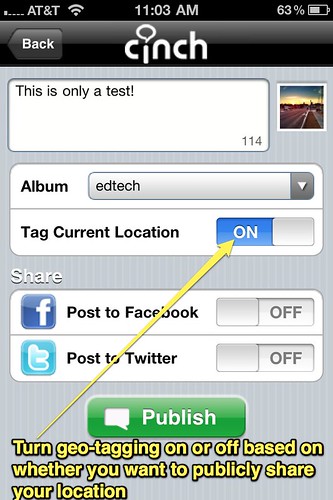The 4 minute video segment, “Smartphone pictures pose privacy risks” by NBC news in November 2010 highlights the risks posed by photo geotagging and social networking sites. Unfortunately, like some other mainstream media press reports on social media, the implications of the segment are irresponsibly portrayed in an extreme, out-of-balance matter. The reporters imply posting geo-tagged photographs of your family online will immediately lead to widespread stalking by child predators and child kidnappings. While geotagging photos does pose privacy risks, it’s not a reason to encourage panic in the streets.
Everyone with a smartphone or ANY type of camera which can record the location where a photograph was taken via geo-tagging should be aware of related privacy implications. Yesterday in my “Technology 4 Teachers” class with undergraduate pre-service students, I demonstrated the free iOS application “Cinch” on my iPad. After recording an audio message, the app prompts users with the option to “Tag current location.”
When I asked my students if it was a good idea to turn that on or off if we were recording an audio message at school, several students immediately responded, “OFF!” My response was, it’s fine to turn it off if you want, but if you’re posting from school and then sharing that audio recording on a school or class website… Anyone with half a brain is going to be able to figure out the location from which you’re sharing the media. The precision with which GPS-enabled geotagging of photos makes possible is eye opening, but it shouldn’t be reason for widespread panic. One of the news anchors in this NBC segment vehemently proclaims, “I’m immediately turning off that feature on my phone as soon as we finish this show.” It doesn’t harm anything if she takes that action, but it might be an over-reaction. Similarly, the reporter’s self-perceived heroic actions of visiting the home of a suburban mom to warn her that her children’s bedroom location was discoverable from her Facebook photos was over-the-top. Should moms and dads everywhere be warned IMMEDIATELY, by a strange reporter or other community do-gooder, that they need to change their smartphone photo privacy settings RIGHT NOW?! Probably not. This is an important capability and privacy issue to discuss, however, but hopefully more balanced approaches can be advocated rather than the one highlighted in this news spot.
When SHOULD geo-tagging be turned off? It might be a good idea to turn off geo-tagging when taking pictures from home. If someone is really intent on stalking someone, however, it’s unlikely a lack of geo-tagged photo information is going to stop that individual. If someone is involved in a hostile divorce relationship or other situation where it’s much more important than “normal” to keep current locations private, not only should geo-tagging be turned off smartphones in the family but photos should probably not be shared online at all. I personally don’t think geo-tagging photos and other recorded media at school should be a big deal, but that (like most things) will vary by location and school context. This is yet another issue which could be taken up by groups fostering conversations about social media guidelines in schools.
What do you think of photo geo-tagging and privacy risks? Are you finding ways in your school and community to promote conversations about these issues and others relating to social media use? What specific advice are you following personally when it comes to geo-tagging of photos and other media? What advice are you giving to others?
Hat tip to Bill Warner for sharing this video.
Technorati Tags:
facebook, geo, news, parent, photo, photography, privacy, share, youtube, geotag, risk, predator, nbc


Comments
One response to “Photo Geotagging Poses Privacy Risks, But Is NOT a Reason for Panic”
Some social networks, like Facebook, recommend that it’s users remove this type of information from their photos if they do not want it to be stored. Read section 2, last sentence of their privacy policy. Free applications like Pixelgarde Photo Privacy Editor, are great alternatives to turning off geotagging for iPhone, Android and PC users, because they allow you to be in control of the information you share.